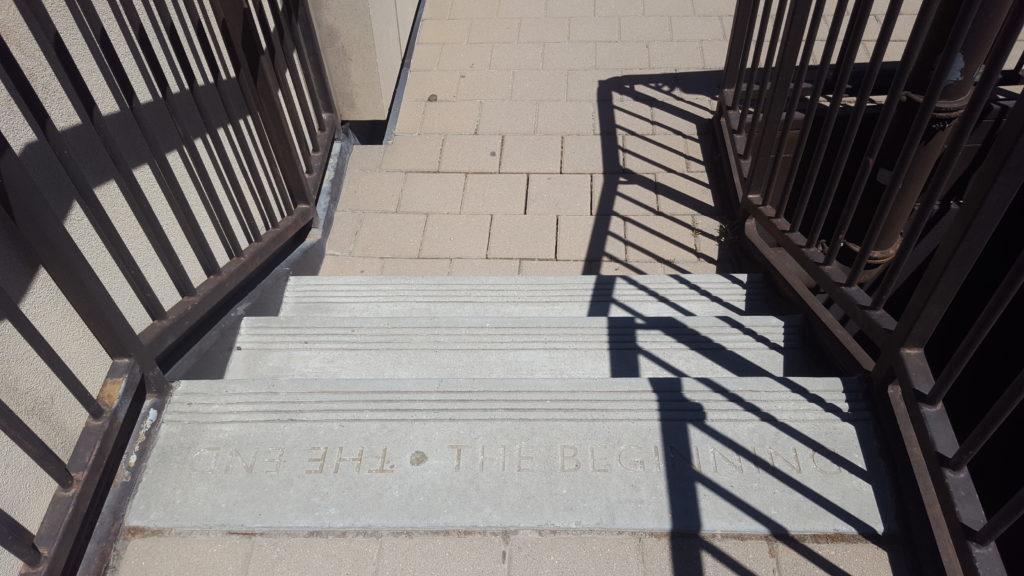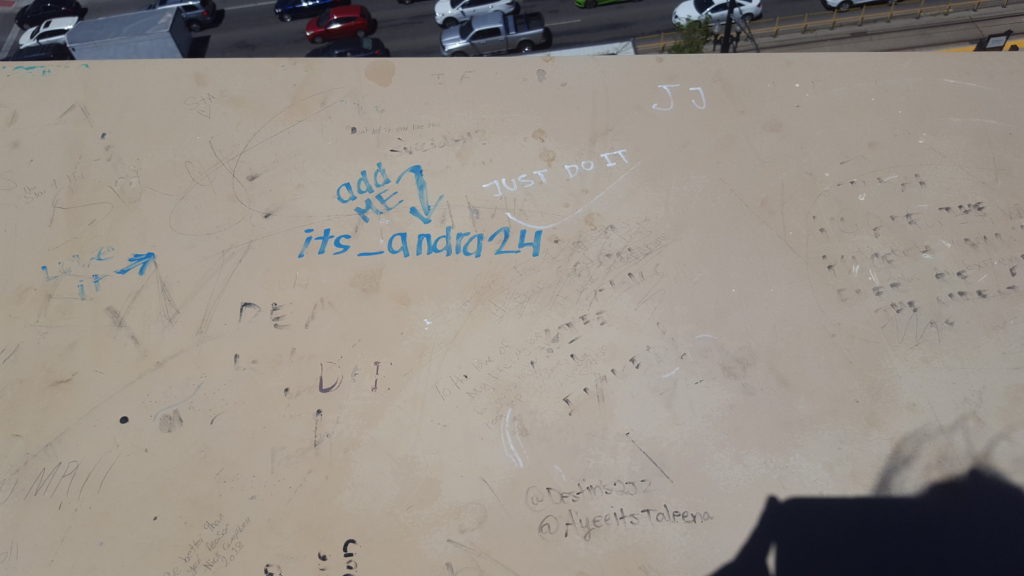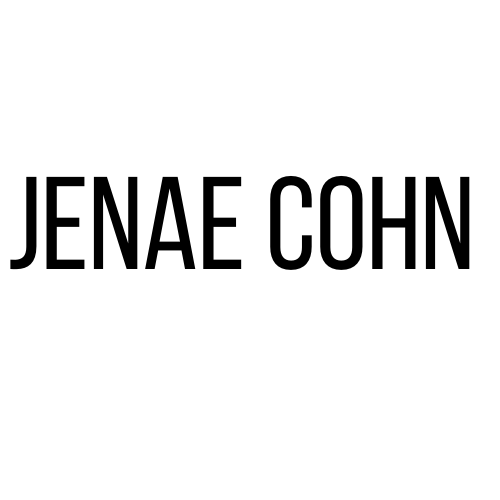
These are the steps on the rooftop of the Salt Lake City Library. In case you can’t read the words etched on to these steps, they read, “The End” and “The Beginning.” I loved the metaphor of this: the steps lead you upwards and outwards to the world and indicate that our ascent into new ideas and new places can signify both a beginning and an end.
As I titled this post, I wondered what day it was. “Is this Day 13 or 14?” I actually asked aloud as I had to click back to my archives to double check. To my astonishment, I find myself on Day 14, halfway through this journey of an NEH institute.
Halfway points are significant, for they are points of departure, the moment when the real action, if you’re following a textbook story arc, is truly about to begin. I’ve read enough action and romance to determine that is at this point in the institute when the huge flash of inspiration for my book comes, when the moment of writing the shining pearl of a sentence happens, and my project is set into full-speed-ahead motion. Right?
Unfortunately, life rarely follows textbook story arcs (a realization that will surprise no one reading this, of course), and as I reflect on this halfway point, I think the most astonishing thing for me has just been the fact that I’ve written something narrative every day (so far; I shouldn’t jinx it!). I’ve not engaged in a daily writing practice in a while (even when I was working on my dissertation, it was rare that I would write every day). So, it’s been a long time since I’ve allowed myself to write publicly every day, knowing that some thoughts may be half-baked, unclear, or just plain weird.
I’m veering a little off-topic from what I’m learning at the institute to make the observation that, during my time in graduate school, I felt immense pressure only to share work that felt perfect, complete, or thorough in some way. Faced with the immense insecurity over my career prospects and the reputation management I strove to do, I felt a constant anxiety over sharing my ideas or the perception that they may seem facile, immature, or ridiculous. I’ll be honest and say that in re-reading this paragraph, I’ve been wondering whether to delete or re-write it out of fear that expressing this vulnerability could still cost me a career prospect in some industry or another, that admitting to this anxiety could undermine my credibility or my professionalism. But I’m leaving it here because I don’t really want to work with anyone who doesn’t think that writing about one’s work is really hard.
Every writer, of course, experiences self-doubt, but mine often felt crippling to the point that I would not write or share anything at all. As much of the conversation in academia is about constant output and publication, the academic publication process evoked more anxiety in me as a writer than nearly any other venue I’d ever published in prior to academe. I’m still recovering from this fear, and my output still never feels like enough, but having the time here at the institute and setting the intention to write something – anything – just to make sure I remember this special experience has been liberating. Even if my writing never gains traction, even if nobody reads it, or on the flip slide, even if lots of people read it and think that what I’ve written here is horrible, at least I’ve done something I’m proud of. This is an exercise, in other words, that has held me accountable to being the person I’ve wanted to be: someone who contributes to conversations that help other people feel empowered to communicate and understand each other.
I think part of my anxiety with sharing my work in the lat few years has been the concern that no one will care about what I’m doing. Part of getting a PhD in the humanities is facing constant skepticism from family and friends about why you’re doing what you’re doing. I can’t count the number of times that I talked to someone who immediately assumed that the work I was doing was useless and out-of-touch because I was getting a graduate degree (the “barista” jokes are not funny. The “why are you studying English, it sounds like you can already speak it!” jokes are not funny. Stop making both of these jokes, seriously). Getting my degree was, of course, a tremendous privilege, and I will forever feel grateful for the opportunity, but I often felt silenced and embarrassed because the reactions I received to my work were often negative and dismissive. Part of that reaction is likely a result of my own inability perhaps to explain my work coherently or in terms that could generalize to a broader audience. At the same time, I also think that the negative reactions often quickly dismissed my work off-hand because my work was in the humanities.
But the point is that I’m (finally) starting to turn a corner here, I think, and just accept that if I do enough, if I write and share even just a little bit at a time, maybe something will stick with someone and that will have been enough. In my everyday work, I often feel re-energized when I see someone learn something new or open up their willingness to try out a new technique and see how it lands. I’ve had trouble bridging that feeling with my writing: seeing an idea “click” for someone offers some immediate gratification in the way that writing often does not. Yet I’m learning to be more satisfied by the quiet landing of a piece of writing launched into the world. These words may float in a pool of digital detritus, but at least they’re my words. At least I’ve left a comment or two out there, so that I have something to point to, some piece of dirt in my digital footprint to say, “There. That’s mine.”

Graffiti etched into the concrete of the barrier looking out from the rooftop of the Salt Lake City Library. There are messages here with Instagram handles and pleas for visitors to “add them” to Instagram.
I went to the Salt Lake City library yesterday and actually felt quite moved by the graffiti I saw scrawled on to the rooftop banisters. There was the usual stuff – “Brittany was here,” “Jason + Kristy [date]” – but I was most struck by the fact that some people had left behind Instagram handles on the graffiti too. Bridging this material, architectural space with the seemingly ephemeral (but perhaps no less permanent) space of social media offered the rather precious reminder that we, people, will always find ways to try and get others to notice us, to listen, to make our literal mark, whether that’s on concrete or in cyberspace (or in both spaces at once!). We’re in a scary and special moment where we’ll all trying to figure out the implications of what making our marks means (I can’t help but think of the rather dire mark of our carbon footprints and climate crisis, for example). But I’m also excited and hopeful that with enough output, with enough critical thinking, and with enough diversity of ideas, that maybe we’ll all have a lot of people who become gradually less afraid to speak out, point to what they wrote, and say, “I did that.”
That’s what I’m trying to do, anyway. We’ll see what happens on the other side of the halfway mark.
